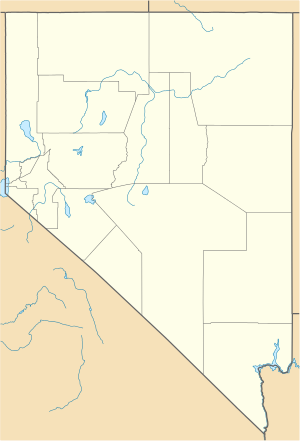The list of National Historic Landmarks in Nevada contains the landmarks designated by the U.S. Federal Government for the U.S. state of Nevada. There are 8 National Historic Landmarks (NHLs) in Nevada. The U.S. National Historic Landmark program is operated under the auspices of the National Park Service, and recognizes structures, districts, objects, and similar resources nationwide according to a list of criteria of national significance. Nevada is home to 8 of these landmarks, highlighting Nevada's frontier heritage and other themes. The National Historic Landmarks Survey: List of National Historic Landmarks by State lists seven landmarks, but includes the Leonard Rockshelter twice, and does not mention the Francis G. Newlands Home.[1] However, the NHL Summary listing lists them correctly.[2]
The table below lists all 8 of these sites, along with added detail and description.
| [3] | Landmark name | Image | Date designated[4] | Location | County | Description |
|---|---|---|---|---|---|---|
| 1 | Fort Churchill |  |
November 5, 1961 (#66000456) |
Weeks 39°17′26″N 119°16′14″W / 39.2906145184°N 119.27060391°W | Lyon | Fort Churchill, named for Sylvester Churchill, was a U.S. Army fort built in 1861 to provide protection for early settlers |
| 2 | Fort Ruby |  |
November 5, 1961 (#66000460) |
Hobson 40°04′04″N 115°31′46″W / 40.06778°N 115.52944°W | White Pine | Fort built during the Civil War to protect links between the Union and California, via the Overland Trail. Landmark status is under review due to fire damage. |
| 3 | Hoover Dam |  |
August 20, 1985 (#81000382) |
Boulder City 36°00′56″N 114°44′16″W / 36.01555555555556°N 114.73777777777778°W | Clark (and Mohave County, Arizona) |
Gravity-arch dam of the Colorado River. World's largest hydroelectric power producing facility and largest concrete structure, when completed in 1935. |
| 4 | Leonard Rockshelter | January 20, 1961 (#66000457) |
Lovelock 39°59′25″N 118°30′36″W / 39.990273°N 118.509922°W | Pershing | Discovered in 1936, this is an archaeological site that shows settlement from 6700 BC up to 1400 AD. | |
| 5 | McKeen Motor Car #70 (Virginia & Truckee Railway Motor Car #22) |  |
October 16, 2012[5] (#05000968) |
Carson City 39°08′54″N 119°46′06″W / 39.14833333333333°N 119.76833333333333°W | One of the few surviving McKeen railcars. Restored to operating condition in 2010. | |
| 6 | Nevada Northern Railway, East Ely Yards |  |
September 20, 2006 (#93000693) |
Ely 39°15′34″N 114°52′11″W / 39.25944444444445°N 114.86972222222222°W | White Pine | The Nevada Northern is one of the best-preserved early twentieth-century railroad shop complexes remaining in the United States. |
| 7 | Francis G. Newlands Home |  |
May 23, 1963 (#66000459) |
Reno 39°31′18″N 119°49′11″W / 39.521653°N 119.819669°W | Washoe | This was the home of Francis G. Newlands from 1890 until his death in 1917, including his tenure in the House of Representatives and Senate. Newlands is known for the Reclamation Act of 1902, under which the U.S. government led the massive development of irrigation in the West. |
| 8 | Virginia City Historic District |  |
July 4, 1961 (#66000458) |
Virginia City 39°18′37″N 119°38′58″W / 39.31027777777778°N 119.64944444444446°W | Lyon and Storey | Virginia City was a prototype for frontier mining boom towns, owing its success to the 1859 discovery of Comstock Lode. |
- ^ "List of National Historic Landmarks by State" (PDF). National Historic Landmarks Program. National Park Service. March 2012. p. 59. Retrieved November 3, 2012.
- ^ "National Historic Landmark summary listing". National Historic Landmark summary listing. National Park Service. Archived from the original on July 10, 2008. Retrieved July 11, 2008.
- ^ Numbers represent an alphabetical ordering by significant words. Various colorings, defined here, differentiate National Historic Landmarks and historic districts from other NRHP buildings, structures, sites or objects.
- ^ The eight-digit number below each date is the number assigned to each location in the National Register Information System database, which can be viewed by clicking the number.
- ^ "Weekly List of Actions Taken on Properties: 10/22/12 through 10/27/12". National Register of Historic Places. National Park Service. Retrieved November 3, 2012.
